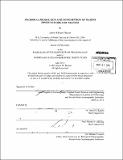| dc.contributor.advisor | Daniel J. Repeta and Edward F. DeLong. | en_US |
| dc.contributor.author | Becker, Jamie William | en_US |
| dc.contributor.other | Woods Hole Oceanographic Institution. | en_US |
| dc.date.accessioned | 2013-09-24T19:34:39Z | |
| dc.date.available | 2013-09-24T19:34:39Z | |
| dc.date.copyright | 2013 | en_US |
| dc.date.issued | 2013 | en_US |
| dc.identifier.uri | http://hdl.handle.net/1721.1/80979 | |
| dc.description | Thesis (Ph. D.)--Joint Program in Oceanography/Applied Ocean Science and Engineering (Massachusetts Institute of Technology, Department of Biology; and the Woods Hole Oceanographic Institution), 2013. | en_US |
| dc.description | Cataloged from PDF version of thesis. | en_US |
| dc.description | Includes bibliographical references. | en_US |
| dc.description.abstract | Marine phytoplankton are the principal producers of oceanic dissolved organic matter (DOM), the organic substrate responsible for secondary production by heterotrophic microbes in the sea. Despite the importance of DOM in marine food webs, details regarding how marine microbes cycle DOM are limited, and few definitive connections have been made between specific producers and consumers. Consumption is thought to depend on the source of the DOM as well as the identity of the consumer; however, it remains unclear how phytoplankton diversity and DOM composition are related, and the metabolic pathways involved in the turnover of DOM by different microbial taxa are largely unknown. The motivation for this thesis is to examine the role of microbial diversity in determining the composition, lability, and physiological consumption of marine DOM. The chemical composition of DOM produced by marine phytoplankton was investigated at the molecular level using mass spectrometry. Results demonstrate that individual phytoplankton strains release a unique suite of organic compounds. Connections between DOM composition and the phylogenetic identity of the producing organism were identified on multiple levels, revealing a direct relationship between phytoplankton diversity and DOM composition. Phytoplankton-derived DOM was also employed in growth assays with oligotrophic bacterioplankton strains to examine effects on heterotrophic growth dynamics. Reproducible responses ranged from suppressed to enhanced growth rates and cell yields, and depended both on the identity of the heterotroph and the source of the DOM. Novel relationships between specific bacterioplankton types and DOM from known biological sources were found, and targets for additional studies on reactive DOM components were identified. The physiology of DOM consumption by a marine Oceanospirillales strain was studied using a combined transcriptomic and untargeted metabolomic approach. The transcriptional response of this bacterium to Prochlorococcus-derived DOM revealed an increase in anabolic processes related to metabolism of carboxylic acids and glucosides, increased gene expression related to proteorhodopsin-based phototrophy, and decreased gene expression related to motility. Putative identification of compounds present in Prochlorococcus-derived DOM supported these responses. Collectively, these findings highlight the potential for linking detailed chemical analyses of labile DOM from a known biological source with bacterioplankton diversity and physiology. | en_US |
| dc.description.statementofresponsibility | by Jamie William Becker. | en_US |
| dc.format.extent | 320 p. | en_US |
| dc.language.iso | eng | en_US |
| dc.publisher | Massachusetts Institute of Technology | en_US |
| dc.rights | M.I.T. theses are protected by
copyright. They may be viewed from this source for any purpose, but
reproduction or distribution in any format is prohibited without written
permission. See provided URL for inquiries about permission. | en_US |
| dc.rights.uri | http://dspace.mit.edu/handle/1721.1/7582 | en_US |
| dc.subject | Joint Program in Oceanography/Applied Ocean Science and Engineering. | en_US |
| dc.subject | Biology. | en_US |
| dc.subject | Woods Hole Oceanographic Institution. | en_US |
| dc.title | Microbial production and consumption of marine dissolved organic matter | en_US |
| dc.type | Thesis | en_US |
| dc.description.degree | Ph.D. | en_US |
| dc.contributor.department | Joint Program in Oceanography/Applied Ocean Science and Engineering | en_US |
| dc.contributor.department | Woods Hole Oceanographic Institution | en_US |
| dc.contributor.department | Massachusetts Institute of Technology. Department of Biology | |
| dc.identifier.oclc | 857788159 | en_US |
